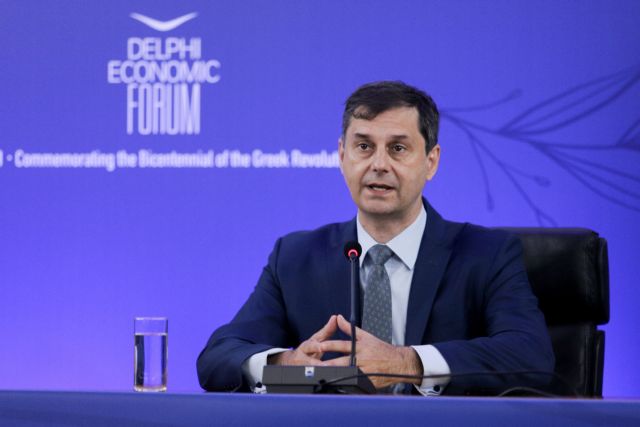
Athens is focusing this summer on the quality of the destination, “not on the number” of visitors, Minister of Tourism Haris Theocharis explained to the French Agency, defending the choice to vaccinate the population of the islands as a priority and citing an approach based on “risk management” to avoid imported cases, which, however, does not preclude recourse to a new lockdown, if the situation so requires.
Question: What are your ambitions for the summer in terms of the number of tourists?
Harris Theocharis: The important thing for us last year was not the number of visitors and it is not this year either. The important thing is the quality of the Greek brand, to act in a way that everyone understands that we take health safety seriously, that we care about the well-being of people and that we do not open our borders without protocols. Last year the number of tourists decreased by 75% compared to 2019, this year it will be better, but we obviously know that 2021 will be just a stage in the years that it will take to reach the level of 2019 again.
We have established a highly digitized system (border arrivals) to avoid any problems. Last year we were the first country to implement digital traveler tracking forms, this year we managed to smooth and optimize this system, we believe that the process will have an even better flow.
Question: You have focused on vaccinations on the islands, but some have had to be restricted following outbreaks. Can you reassure tourists who planned to go there this summer and what they would have to fear from local restrictions?
Harris Theocharis: In more than a third of the islands, ie in 40, the entire population has already been vaccinated. In the other islands, the larger ones, everyone will have been vaccinated by the end of June. Until then, we protect them: before anyone leaves the mainland for the islands, they must either be fully vaccinated or have been tested. We take health safety very seriously. And we will not hesitate to take all necessary measures to protect our friends abroad and of course our compatriots. But we are also doing everything so that we do not have to resort to these measures.
Last August, Crete, which received one million tourists, had a positive rate of two-thirds of the national average. With all this in mind, we believe the risk is manageable.
Question: You are trying to persuade the British to remove you from the list of dangerous countries. You have also decided to accept those vaccinated with the Russian Sputnik vaccine, while this vaccine has not been approved for your population…
Harris Theocharis: We are actively discussing [with the United Kingdom] to explain our system, the situation in the various regions. I am not saying that they will make the decision [to remove Greece from this list], each country has the right to make decisions according to its own criteria, but we are ready to provide them with all the necessary data. Our numbers are transparent.
[Regarding Sputnik], it is one thing to have a green light for a vaccine intended for your compatriots and another to assess the risk posed by people who have been vaccinated with Sputnik, which many doctors in Greece believe to be very effective. The approach we take is based on risk management: the World Health Organization recommends that we consider tourists low-risk persons. But even if someone is vaccinated, they can get tested on arrival. Our border targeting system is very sophisticated. If we see more positive tests among people who have been vaccinated with Sputnik, we will enhance the tests upon arrival. The same goes for people who have been vaccinated with the Pfizer vaccine.
Latest News

New Exposé by Domumento Reveals Nefarious Triangular Link of ‘Black Money’ with New Democracy, Blue Skies, & Truth Team
The latest exposé by the Documentonews.gr news site lays bare what appears to be a surreptitious path of indirect financing of ND through the business sector—transactions that, as widely understood, rarely occur without expectations of reciprocal benefit

PM Meloni Meets Vice President Vance in Rome Signalling Optimism on Ukraine Talks
Meloni emphasized the strength and strategic value of the Italy-U.S. partnership.

Airbnb: Greece’s Short-Term Rentals Dip in March Amid Easter Shift
Data from analytics firm AirDNA shows that average occupancy for short-term rentals dropped to 45% in March, down from 49% the same month last year.

Easter Week in Greece: Holy Friday in Orthodoxy Today
At the Vespers service on Friday evening the image of Christ is removed from the Cross and wrapped in a white cloth

Meloni and Trump Meet in Washington, Vow to Strengthen Western Ties
“I am 100% sure there will be no problems reaching a deal on tariffs with the EU—none whatsoever,” Trump stressed.

ECB Cuts Interest Rates by 25 Basis Points in Expected Move
The ECB’s Governing Council opted to lower the deposit facility rate—the benchmark for signaling monetary policy direction—citing an updated assessment of inflation prospects, the dynamics of underlying inflation, and the strength of monetary policy transmission.

Current Account Deficit Fell by €573.2ml Feb. 2025: BoG
The improvement of Greece’s current account was mainly attributed to a more robust balance of goods and, to a lesser extent, an improved primary income account

Hellenic Food Authority Issues Food Safety Tips for Easter
Food safety tips on how to make sure your lamb has been properly inspected and your eggs stay fresh.

Greek Kiwifruit Exports Smash 200,000-Ton Mark, Setting New Record
According to data by the Association of Greek Fruit, Vegetable and Juice Exporters, Incofruit Hellas, between September 1, 2024, and April 17, 2025, kiwifruit exports increased by 14.2%.

Easter Tourism Boom: Greece Sees 18.3% Surge in Hotel Bookings
Among foreign markets, Israel has emerged as the biggest growth driver, with hotel bookings more than doubling—up 178.5% year-on-year.







![Πλημμύρες: Σημειώθηκαν σε επίπεδα ρεκόρ στην Ευρώπη το 2024 [γράφημα]](https://www.ot.gr/wp-content/uploads/2025/04/FLOOD_HUNGRY-90x90.jpg)





![Airbnb: Πτωτικά κινήθηκε η ζήτηση τον Μάρτιο – Τι δείχνουν τα στοιχεία [γράφημα]](https://www.ot.gr/wp-content/uploads/2024/07/airbnb-gba8e58468_1280-1-90x90.jpg)











![Επιχειρήσεις: Με τι επιτόκιο δανείζονται – Πώς θα ξεκλειδώσει περισσότερη ρευστότητα [γράφημα]](https://www.ot.gr/wp-content/uploads/2025/04/daneia-trapezes-768x432-1-600x338.jpg)














 Αριθμός Πιστοποίησης
Αριθμός Πιστοποίησης